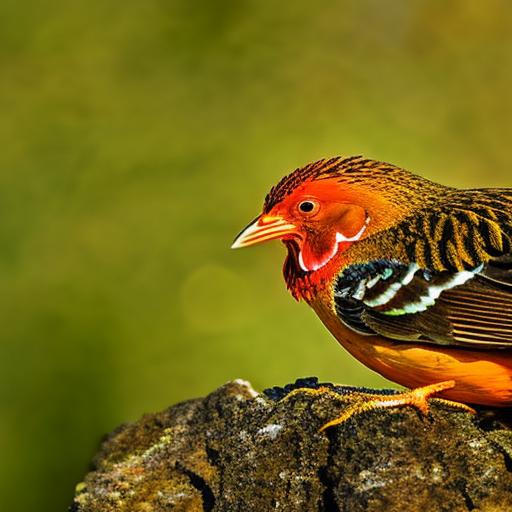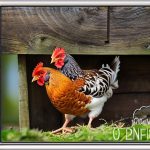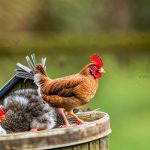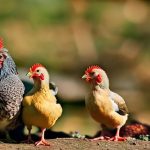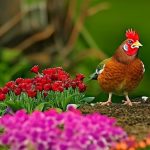Keeping animals with chickens can be a fun and rewarding experience. Not only does it provide companionship for the chickens, but it can also offer benefits for both the animals and the chickens themselves. By introducing other animals into the chicken coop, you can create a harmonious environment where different species can coexist and thrive.
Key Takeaways
- Keeping animals with chickens can provide numerous benefits
- Considerations such as size, temperament, and diet should be made before adding animals to your chicken coop
- Animals that can coexist peacefully with chickens include ducks, geese, and turkeys
- Animals that should not be kept with chickens include dogs, cats, and ferrets
- Introducing new animals slowly and providing adequate space and resources can help prevent conflicts and promote successful cohabitation
Benefits of keeping animals with chickens
One of the main benefits of keeping animals with chickens is that they can help control pests and weeds in the coop and surrounding area. For example, ducks are excellent at eating slugs and snails, while guinea pigs can help keep grass and weeds under control. By having these animals in the coop, you can reduce the need for chemical pesticides and herbicides.
Another benefit is that chickens can provide protection for smaller animals from predators. Chickens are natural guardians and will often sound the alarm if they sense danger. This can help protect animals like rabbits or guinea pigs from potential threats. Additionally, the presence of other animals can provide enrichment and stimulation for chickens, as they have the opportunity to observe and interact with different species.
Considerations before adding animals to your chicken coop
Before adding other animals to your chicken coop, there are a few considerations to keep in mind. First, make sure the animals you choose are compatible with chickens in terms of temperament and dietary needs. Some animals may be more aggressive or have different dietary requirements that may not be suitable for cohabitation with chickens.
Secondly, consider the size of your coop and whether it can accommodate additional animals. Each animal will require its own space to move around comfortably, so make sure there is enough room for everyone. Additionally, check local regulations to ensure you are allowed to keep certain animals in your area. Some municipalities may have restrictions on keeping certain species or may require permits.
Animals that can coexist peacefully with chickens
There are several animals that can coexist peacefully with chickens in a coop setting. One example is ducks. Ducks and chickens have similar dietary needs and can often be raised together without any issues. Ducks also help control pests and weeds, making them a beneficial addition to the coop.
Guinea pigs are another animal that can live harmoniously with chickens. They are herbivores and will not compete with chickens for food. Guinea pigs can also help keep grass and weeds under control, making them a useful addition to the coop.
Rabbits can also be kept with chickens, as long as they have their own separate space within the coop. Rabbits are herbivores and will not compete with chickens for food. They can provide companionship for the chickens and help keep the coop clean by eating any dropped food or vegetation.
Quail are another animal that can coexist peacefully with chickens. They have similar dietary needs and can be raised together without any issues. Quail are also beneficial for pest control, as they eat insects and other small pests.
Animals that should not be kept with chickens
While there are many animals that can coexist peacefully with chickens, there are some species that should not be kept together. Cats, for example, are natural predators and may pose a threat to chickens. Dogs can also be a danger to chickens, especially if they have a high prey drive. Ferrets and snakes should also be kept separate from chickens, as they may view them as prey.
How to introduce new animals to your chicken coop

When introducing new animals to your chicken coop, it is important to do so gradually and carefully. Start by introducing the animals to each other in a neutral area outside of the coop. This allows them to become familiar with each other’s presence without feeling territorial.
Supervise interactions between animals until they are comfortable with each other. This may involve keeping them in separate enclosures within the coop initially and gradually allowing them to interact under supervision. This will help prevent any aggressive behavior or territorial disputes.
Provide separate food and water sources to prevent competition. Each animal should have its own designated area for feeding and drinking to ensure that everyone has access to the resources they need.
Providing adequate space and resources for multiple animals
When keeping multiple animals in a chicken coop, it is important to ensure that there is enough space for everyone to move around comfortably. Each animal should have enough room to stretch, exercise, and exhibit natural behaviors.
Provide separate areas for each animal to sleep and eat. This will help prevent competition and ensure that each animal has its own designated space. Additionally, make sure there are enough resources such as food, water, and nesting boxes for all animals. This will help prevent any conflicts over limited resources.
Potential health risks and how to prevent them
When keeping multiple animals in a chicken coop, there are potential health risks that need to be considered. Some animals may carry diseases that can be harmful to chickens. It is important to quarantine new animals before introducing them to the coop. This will help prevent the spread of any potential diseases.
Keep the coop clean and practice good hygiene to prevent the spread of disease. Regularly clean the coop and remove waste to minimize the risk of infection. Additionally, provide separate areas for each animal to eliminate waste to prevent contamination.
How to manage waste and keep the coop clean with multiple animals
Managing waste is an important aspect of keeping a clean and healthy coop with multiple animals. Regularly clean the coop and remove waste to prevent the buildup of bacteria and parasites. This can be done by scooping out soiled bedding or using a deep litter method.
Consider using deep litter or composting methods to manage waste. Deep litter involves adding layers of bedding material such as straw or wood shavings on top of the existing bedding. This helps absorb moisture and control odors. Composting waste can also be a sustainable way to manage waste and create nutrient-rich compost for your garden.
Provide separate areas for each animal to eliminate waste. This will help prevent contamination and ensure that each animal has a clean and hygienic space.
Conclusion and tips for successful animal cohabitation in a chicken coop
Keeping animals with chickens can be a fun and rewarding experience. It provides companionship for the chickens and offers benefits for both the animals and the chickens themselves. However, it is important to consider compatibility, space, and resources before adding animals to your coop.
Practice good hygiene and manage waste to prevent health risks. Regularly clean the coop, quarantine new animals, and provide separate areas for each animal to eliminate waste. With proper planning and care, multiple animals can coexist peacefully in a chicken coop, creating a harmonious environment where different species can thrive together.
If you’re interested in keeping chickens, you’ll definitely want to check out this informative article on chicken coop door size. Having the right size door is crucial for the safety and comfort of your feathered friends. You can find all the details and tips you need at https://poultrywizard.com/keeping-chickens/chicken-coop-door-size/. Additionally, if you’re looking for plans to build a chicken coop run, this article has got you covered. It provides step-by-step instructions and helpful tips to create a secure and spacious run for your chickens. You can find the plans at https://poultrywizard.com/keeping-chickens/chicken-coop-run-plans/. Lastly, if you’re in need of ideas for a large chicken coop, this article offers some fantastic inspiration. From design concepts to practical considerations, it covers everything you need to know. Check it out at https://poultrywizard.com/keeping-chickens/large-chicken-coop-ideas/. Happy chicken keeping!
FAQs
What animals can be kept with chickens?
Animals that can be kept with chickens include ducks, geese, turkeys, and guinea fowl.
What animals should not be kept with chickens?
Animals that should not be kept with chickens include dogs, cats, and predatory birds such as hawks and owls.
What are the benefits of keeping other animals with chickens?
Keeping other animals with chickens can provide companionship, pest control, and additional sources of food such as eggs or meat.
What are the risks of keeping other animals with chickens?
The risks of keeping other animals with chickens include the potential for disease transmission, aggression between animals, and competition for resources such as food and water.
How should I introduce new animals to my chicken flock?
New animals should be introduced slowly and carefully, ideally in a separate enclosure adjacent to the chicken coop. This allows the animals to become familiar with each other without risking injury or aggression.
What should I do if my chickens are being bullied by other animals?
If your chickens are being bullied by other animals, it may be necessary to separate them or provide additional resources such as food and water to reduce competition. Consult with a veterinarian or animal behaviorist for further advice.
Meet Walter, the feathered-friend fanatic of Florida! Nestled in the sunshine state, Walter struts through life with his feathered companions, clucking his way to happiness. With a coop that’s fancier than a five-star hotel, he’s the Don Juan of the chicken world. When he’s not teaching his hens to do the cha-cha, you’ll find him in a heated debate with his prized rooster, Sir Clucks-a-Lot. Walter’s poultry passion is no yolk; he’s the sunny-side-up guy you never knew you needed in your flock of friends!

